A trail ride in Ethiopia was like being sucked into a time warp: clay huts next to the rivers, donkeys and horses gathering by the streams to drink water. No electricity, no cell phones. The way it was 3000 years ago. Living off the grid. No doubt we loved it.
This is the final part of a seven-part-long story about our week-long trekking in the Ethiopian Bale mountains. Read about the beginning of our adventure here.
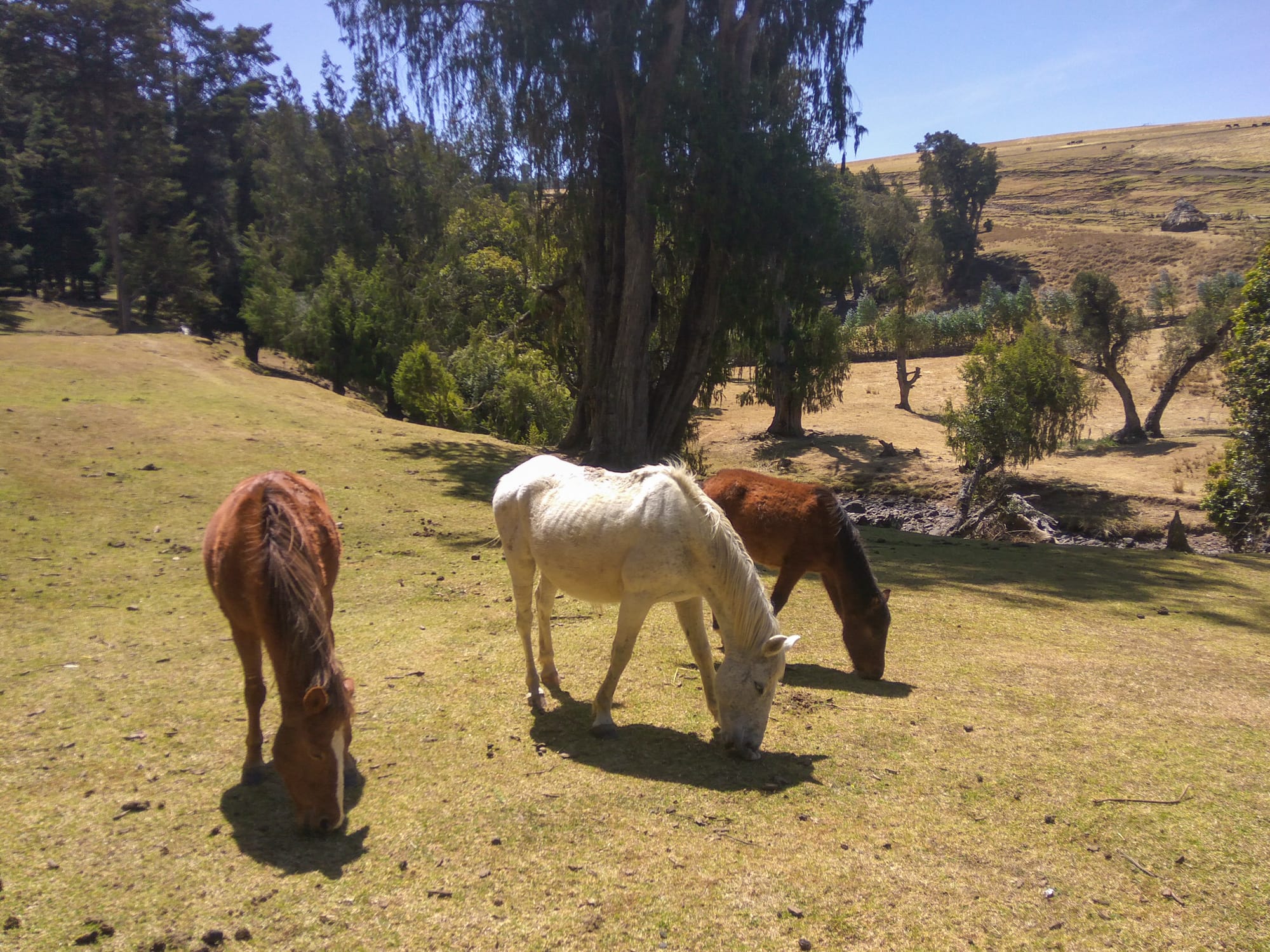
Day 6
We were definitely looking forward to a shower and a warm room without fleas to sleep in but the prospect of leaving the Bale Mountains still made us feel sad. On the last day of our riding trip, the path was leading downhill – we were leaving the mountains behind. We rode through the forests again. One more time we got a glimpse of the monkeys, hanging from the top of the trees.
The break at a river was one of the highlights of this trip and maybe even one of the highlight of all our trips. The rushing waters attracted animals: donkeys, horses, goats and sheep. The animals were peacefully stopping for a drink before returning to the green pastures. Both banks of the river were framed with thick willows. The clay thatched huts had a lucky position on the hills by the river. Things probably have not changed here for the last 3000 years.
Then we spotted a donkey with a big wound on his back, probably from the harness of some carriage or from a fight with another donkey. The open flesh attracted flies, which he tried to fend off with his tail. When the beauty around is perfect, pain and illness feel especially out of place. My heart was breaking for this little guy. I wished we could take him to a veterinary but had anybody here actually heard of a veterinary clinic? Are there sanctuaries for old and ill donkeys in Ethiopia like there are in Greece "Walking with donkeys"? Probably not. Living off grid also has some disadvantages. I felt so bad for doing nothing for him. I hoped he would not have to work until his wound had healed.
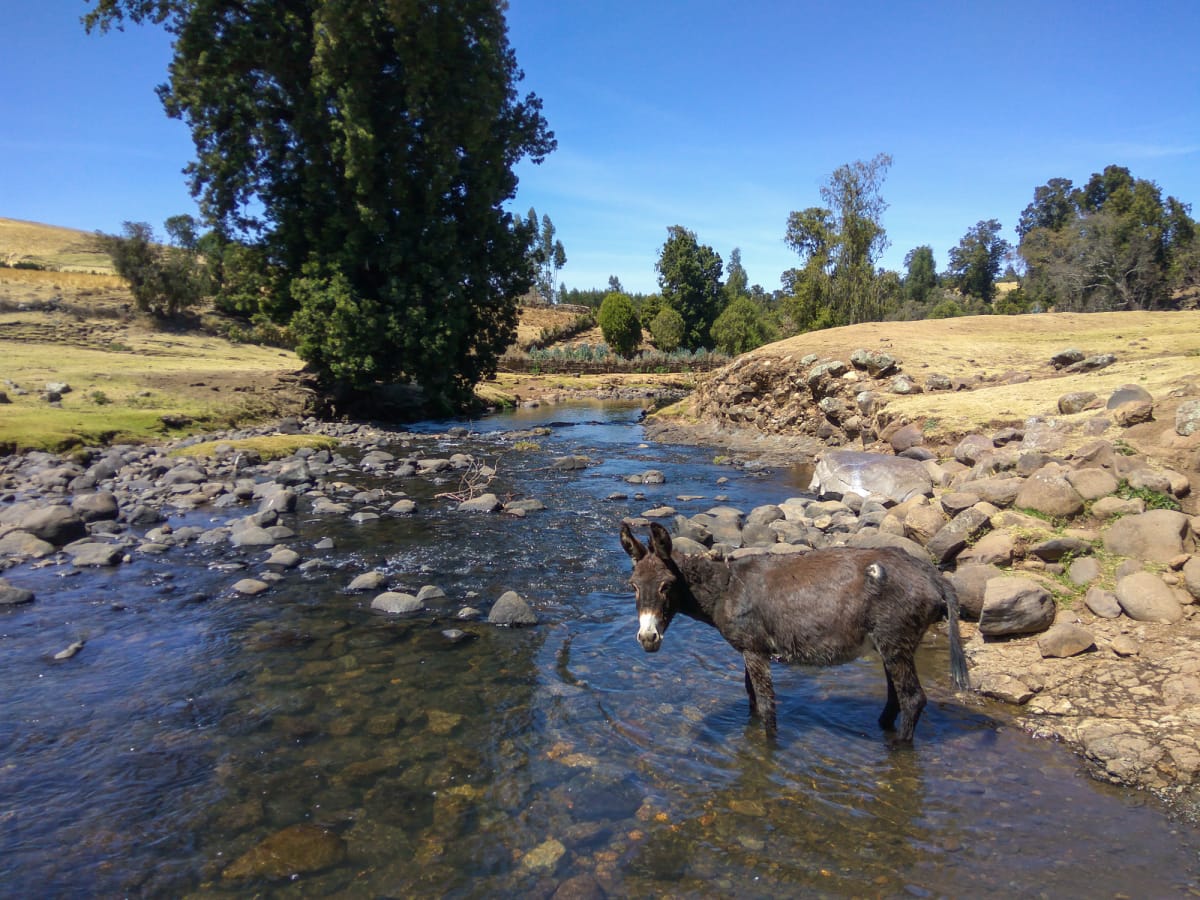
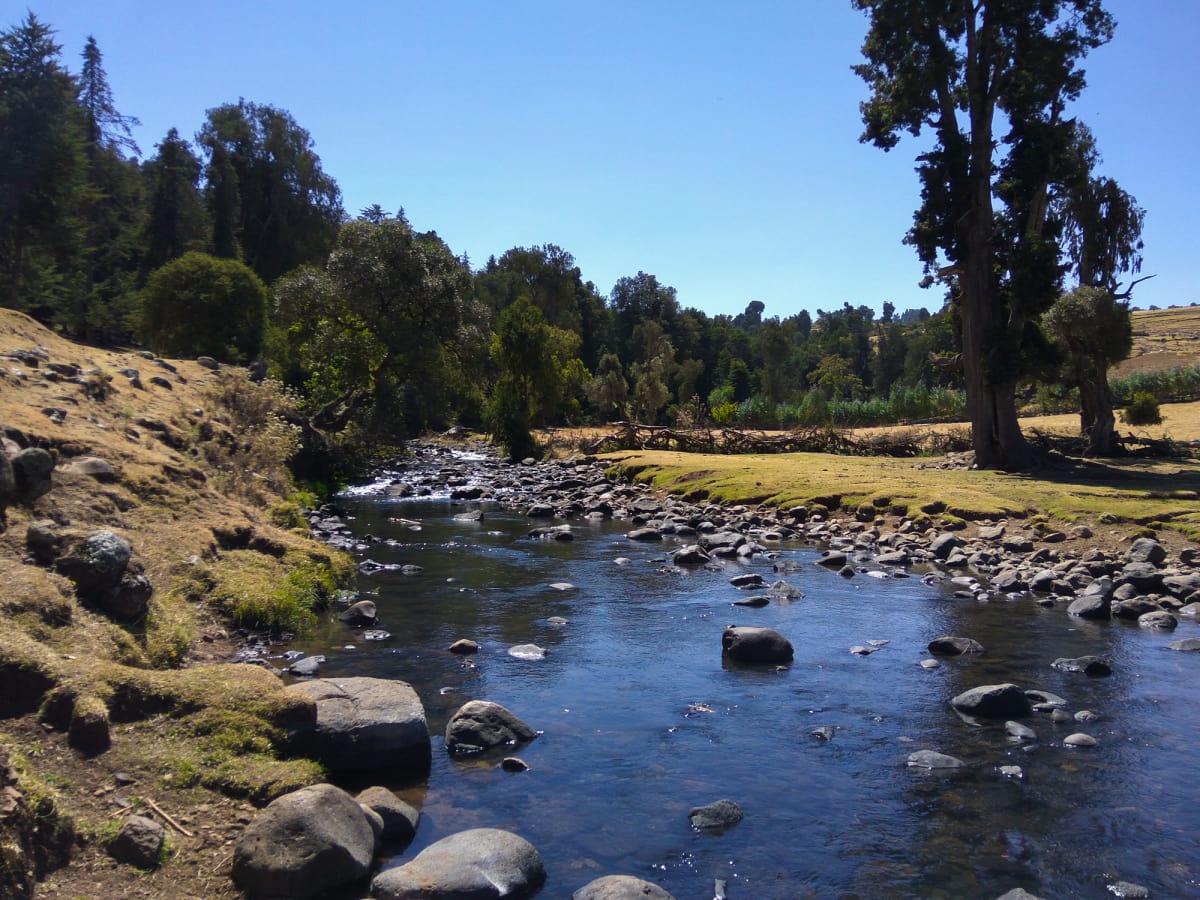
Another healthy donkey was running behind a she-donkey indicating that he was in an urgent need of mating. The gal was running in circles, occasionally making stops to kick the molester with her back hoofs.
Observing the animals was fascinating, we didn´t want to come back to the 'normal' world. We had our doubts we would find a place as lovely as this in all the rest of Ethiopia.
However, our backup team was in a rush to get home sooner. They kept urging us to go and we finally let them walk ahead, planning to catch up with them later.
The path towards the town was getting broader and busier, there were donkey-drawn carriages as well as walking and riding people on our way once again.
A local guy on a horse with some really beautiful gear was quite excited to meet us. He pulled out his old cellphone and communicated in gestures that he wanted to take a picture of us.
Another hour later, the woods opened up and the path turned into a broad road on a plain. It was a good road to gallop. That day we figured out how we could make it happen. A horse handler brought a big heavy leather whip with him, just the sound of it made my horse run for dear life. Balti’s horse was neither afraid of the sound of the whip, nor of being beaten with it. However, it didn´t like to fall behind my horse and galloped easily when my horse started running. Taking all that into consideration, Balti took the whip from the handler and whipped it through the air like a propeller of a helicopter. Hearing the sound of that, my horse started running and Balti’s horse eagerly followed. Our butts were sore and since galloping actually requires less contact with the saddle than trotting does, we either let our small horses gallop or walk.
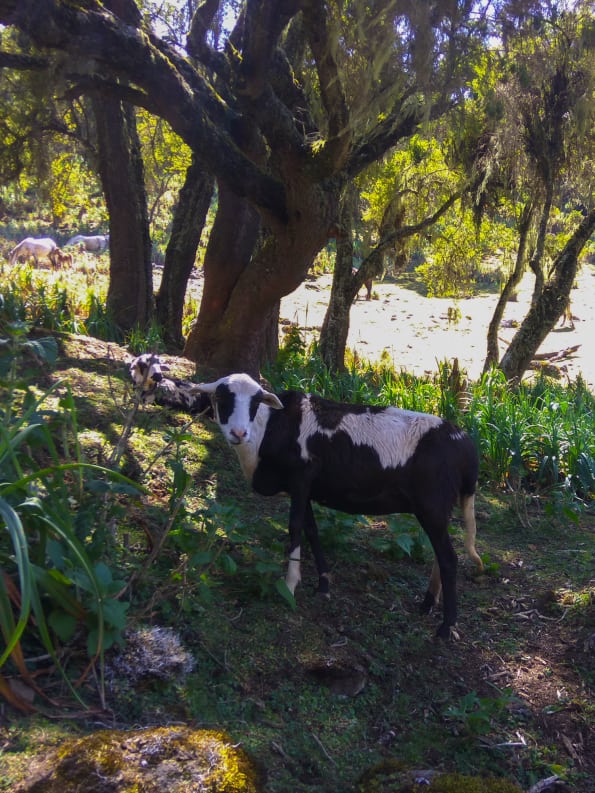
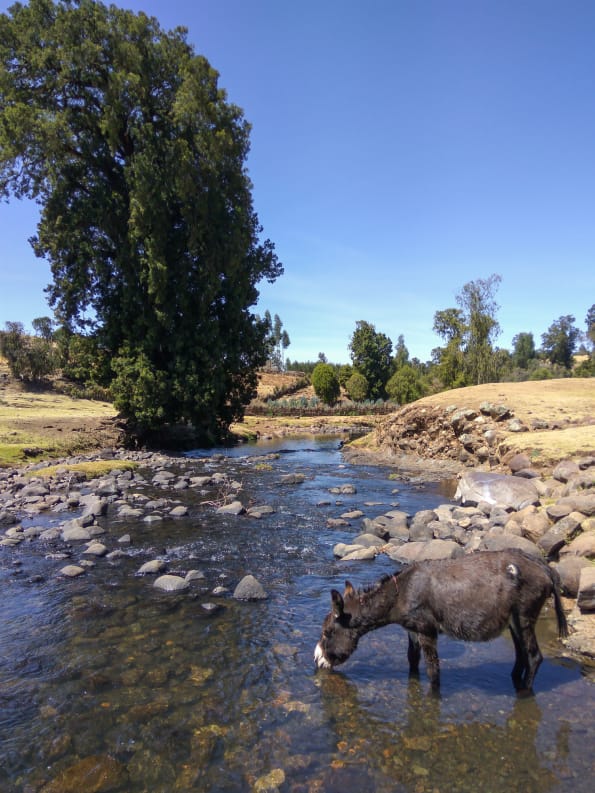
After we had reunited with the rest of our group, the cook started telling us stories about the tips he received from other travellers. People tipped him with hundreds of birr. There was a French guy who gave him his coat with money hidden in it. There was no way to get him wrong.
On one hand, we felt sorry for him: it was probably his desperate financial situation (easily recognizable from his cloth) that urged him to follow us and drew him to his self-assignment as our butler. Here is an example of what I mean: Every time I took a pot from the fire to pour the boiling water into cups he tried to get in charge of the pot and do it himself.
On the other hand, I didn´t approve of his tactics. In my book, the group of people brought together by trekking is egalitarian – there are no masters and servants but everybody is equal and has to do his part of the work. So every time the cook got his fingers on the pot, I fasten my grip and pulled the pot to myself, insisting that I don´t need any assistance.
However, we would have eagerly paid him for the favours we obviously needed, like fixing the riding gear or even better - if he had found himself a horse and replaced our guide who insisted on walking.
In the very end, he was not left without anything at all. Every morning he organized some fresh milk and some bread for us from the locals and charged us the price it would probably cost in Norway or Switzerland. We were not complaining: the milk was A-class and so was the bread. We just had our doubts he gave all that money to the locals without taking a generous commission for himself.
Then again, we felt guilty for the poverty of the cook and the guide. We did nothing to change the system that leaves the Ethiopians without fairly paid jobs and even support this system by accepting its rules. But still, the guide and the cook were really the part of the trip that we disliked the most.
We were still hesitating, whether we should tip them or not when they put us on the bus leaving for the town of Awassa and waited outside for the bus to part. We didn´t know how we should act and we didn´t know how things could be changed on a bigger level. We still don´t know.
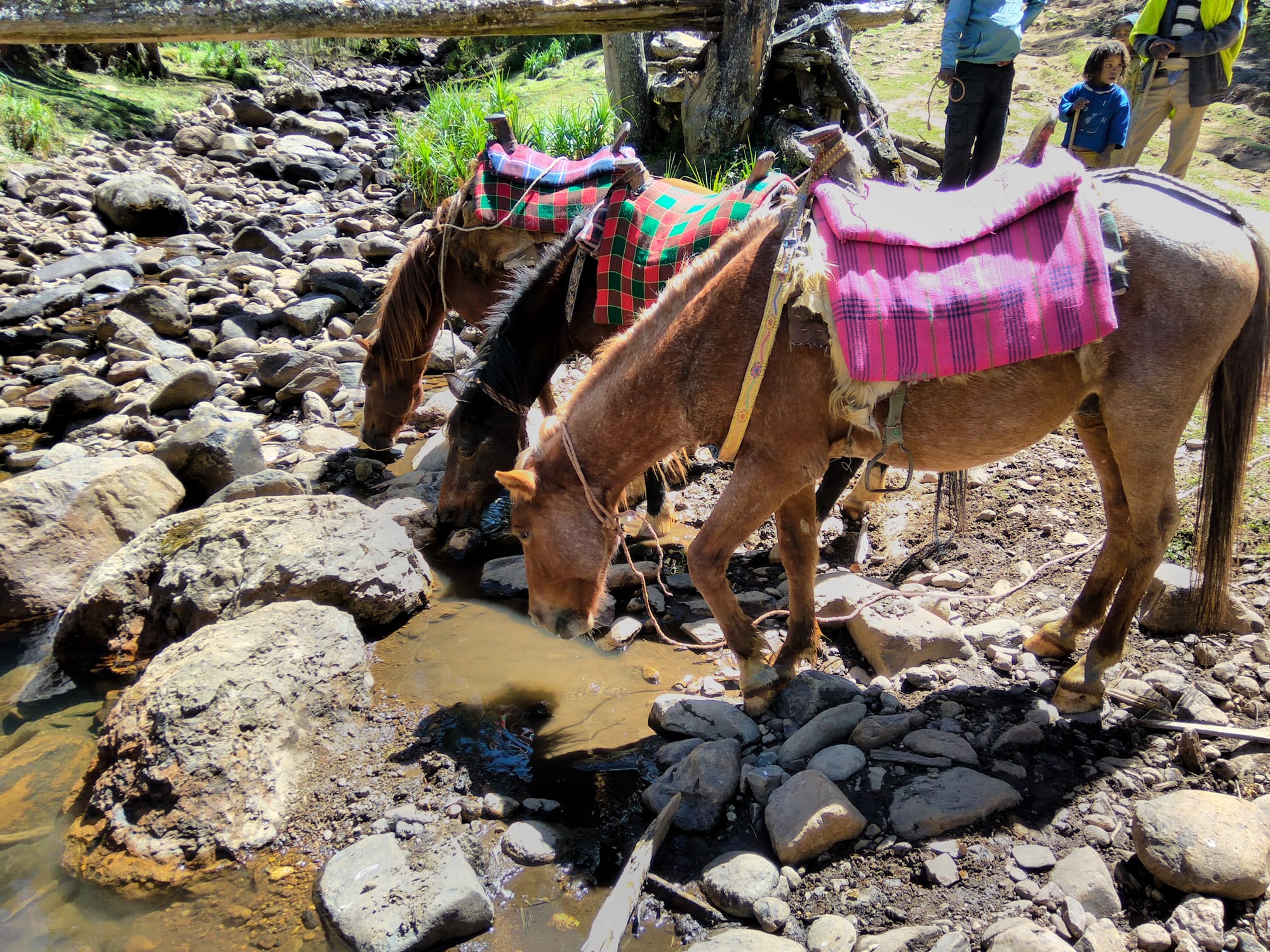
Epilogue In Awassa, we checked in at one of the best hotels in town (35 EUR per night!), there was security armed with Kalashnikovs in a guardhouse in front of it. I don´t know how they let us inside – considering how dirty, sunburnt and flea-bitten we were.
We have never ever been that dirty before in our lives – I guess it was the fine dust, lifted by the hoofs of the horses that was to be blamed. My bright ultramarine Quechua backpack turned pale grey even in the trash bag on horses' backs.
We had to shower several times – ordinary shower gel and shampoo couldn´t combat the mountain dust in one go. The following day, our laundry was easily visible, drying on the big balcony of our big fancy hotel, from the street.
Ethiopia Bradt Travel Guide: We found it to be the best among the Ethiopia travel guides! Our aforementioned tent Our sleeping bags 'Vango' kept us warm during the cold nights in the mountains
it is you who keeps our site running and helps us grow and bring you more stories from our trips and the local people we encounter. We believe that telling these stories brings the world closer together and is hence a way to make a positive change! Please support us with a small donation on the kofi platform. Even a small contribution makes a big difference!


